Luxembourger of Iranian Descent Sentenced To Death By Islamic Republic
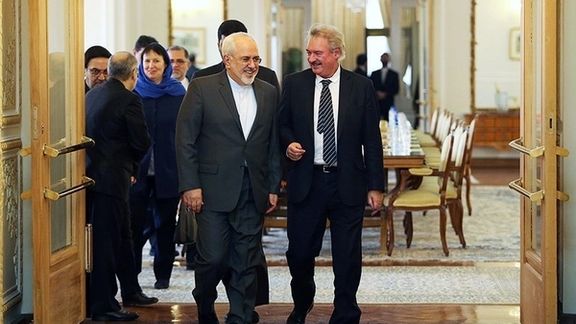
Luxembourg’s Foreign Ministry says a resident of the country of Iranian descent has been arrested in the Islamic Republic and sentenced to death.

Luxembourg’s Foreign Ministry says a resident of the country of Iranian descent has been arrested in the Islamic Republic and sentenced to death.
Foreign Minister Jean Asselborn spoke on the phone with his Iranian counterpart Hossein Amir- Abdollahian to discuss the case and speak about the situation in the country.
According to the statement from the Luxembourg Foreign Office, Minister Asselborn supports the efforts of the EU and member countries to stand up for the rights of Iranian demonstrators. Luxembourg opposes the death penalty without exception, calling it a cruel and inhuman punishment.
In the readout of the conversation issued by the Islamic Republic, there is no mention of the Luxembourger who faces execution. The Iranian foreign minister only said that he voiced Tehran’s willingness for closer relations with Luxembourg in various fields.
Protests have been raging in Iran for over three months with people seeking the fall of the clerical regime. The Islamic Republic has been cracking down on protesters while blaming foreign countries for the unrest.
On September 30, Iran’s Intelligence Ministry announced the detention of at least nine non-Iranian citizens from Germany, Poland, Italy, France, the Netherlands and Sweden. On October 20, Fars New Agency, which is affiliated with the Revolutionary Guard, said “citizens of 14 countries, including the United States, Russia, Austria, France, the United Kingdom, and Afghanistan, have been arrested in recent riots in Iran.”
The Regime has sentenced dozens of protesters to death and has hanged two of them so far with many more facing imminent execution.
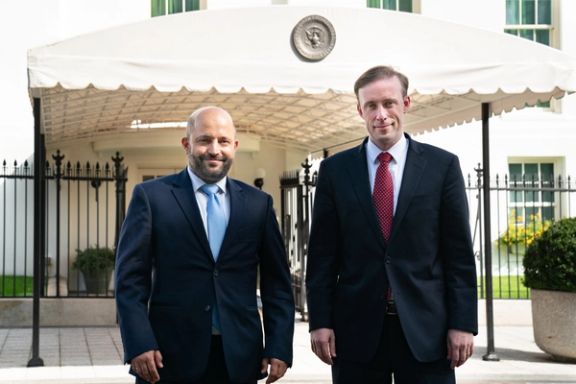
US National Security Advisor Jake Sullivan and his Israeli counterpart Eyal Hulata held a discussion Thursday over Islamic Republic growing’s military cooperation with Russia.
Senior representatives from foreign policy, defense, and intelligence agencies also took part in the virtual meeting of the US-Israel Strategic Consultative Group (SCG). The national security chiefs and their aides reviewed Islamic Republic’s growing military relationship with Russia, including the transfer of weapons the Kremlin is deploying against Ukraine, targeting its civilian infrastructure, and Russia’s provision of military technology to Iran in return.
The officials also expressed commitment to countering Iran’s threats in the region, and to ensuring that Tehran can never acquire a nuclear weapon.
According to a read out of the meeting released by the White House, they also discussed the broad array of economic sanctions imposed in recent months against Iran, reviewed ongoing cooperation and exercises between the US military and Israel Defense Forces, and assessed means for enhancing Israel’s security and economic integration throughout the Middle East region.
British defense minister Ben Wallace also said on Tuesday that Russia was planning to give Iran advanced military components in exchange for hundreds of drones. "Iran has become one of Russia's top military backers," Wallace said.
The West is particularly concerned over the possibility of Iran supplying missiles to Russia, as Moscow’s stockpiles dwindle.
Russian Energy Minister Nikolai Shulginov said in a statement on Tuesday that Russian companies are interested in cooperating with Iran on gas turbine technology and joint production. Russia has been trying to start producing its own gas turbines of medium or large capacity for years, but is yet to fine tune the process.

A conservative politician and former lawmaker has accused hardliners of pursuing policies that have increasingly isolated Iran in the international community.
Mansoor Haqiqatpur told Didban Iran website that hardliners who insist on radical approaches hold key positions in the government. Although he did not name any politician, most members of Iran’s parliament and the presidential administration are hardliners, many coming from the Revolutionary Guard.
"They are the same politicians who advocated the attack on the Saudi embassy [in 2016], attacked Ali Larijani [during a speech in Qom in 2012] and insulted Ayatollah Ruhollah Khomeini's grandson Hassan Khomeini in front of foreign guests[ in June 2022],” Haqiqatpur, who is close to former parliament speaker Larijani, said.
Ali Larijani was pushed out of the political spotlight after the 2020 parliamentary elections engineered to hand an absolute majority to hardliners, but he is considered a leader for traditional conservatives as opposed to ultra-conservatives currently in power.
Larijani’s ally further charged that while the revised edition of the 2015 nuclear deal with world powers was ready for final approval by all the parties involved, the hardliners prevented the outgoing Rouhani administration from signing it in mid-2021.
Haqiqatpur added that hardliners constantly impose their ideas on the government, but he claimed their positions are not in line with the regime's general policies.
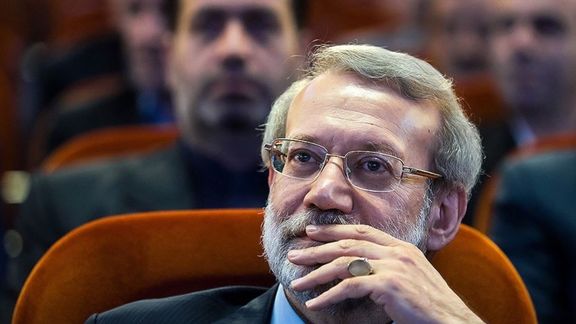
This kind of comment aimed at distancing the Iranian government from the actions of radicals that harm Tehran’s ties with the world have been made by several politicians during the past weeks. However, no one has explained why and how hardliners can impose their views on the government if they are not supported by Supreme Leader Ali Khamenei who has the final say about everything in Iran and micromanages every single move in Iran's domestic and international politics.
But not mentioning Khamenei's role is understandable because that would probably mean big trouble for whoever criticizes him and no media in Tehran would publish such an interview.
Haqiqatpur stressed that Iranians are experiencing hardships because Iran has severed its ties with the rest of the world. He reiterated that Iran should maintain ties with all countries, in particular with the United States and the United Kingdom, except Israel.
In domestic politics, he said, the hardliners talk about compulsory hijab in a bad language. He was probably referring to IRGC Qods Force Commander Esmail Qaani who insulted Iranian women during a December 20 angry speech. He advised that such officials should watch their mouth and control their behavior.
Some of Iranian media such as the Kayhan newspaper that operates under the supervision of Khamenei are known for badmouthing prominent individuals. Recently, the Kayhan and its editor Hossein Shariatmadari have been widely criticized for their ruthless attack on Ayatollah Mostafa Mohaqeq Damad who had called for stopping the execution of Iranian protesters.
After the news of cleric's views and his brave letter to the Revolutionary Court judges were picked up by international media, the Kayhan accused him of catering to the needs of Western propaganda against Iran.
Shariatmadari also tried to defend Iran's President Raisi who has been largely ignored by both the media and the people during the Iran protests. The hardliner editor praised him for his baseless bragging about Iran's progress during his presidency, which is otherwise seen by many as a complete failure.
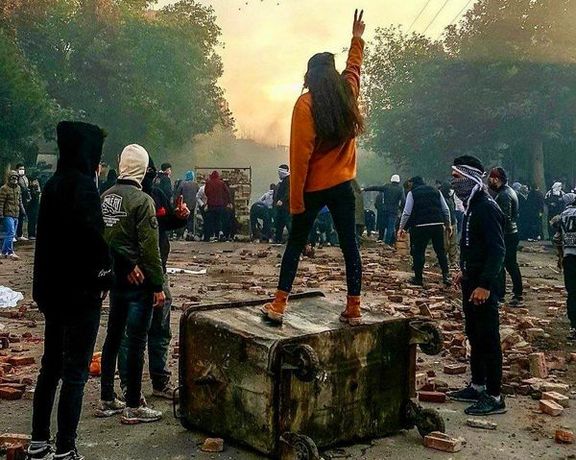
A group of more than 230 current and former UN officials, judges, human rights experts, Nobel laureates, and NGOs called on world leaders to intensify pressure on Islamic Republic.
In their open letter released on Wednesday, they addressed US President Joe Biden, European Council President Charles Michel, UK Prime Minister Rishi Sunak, and Canadian Premier Justin Trudeau as well as UN High Commissioner for Human Rights Volker Türk urging a firm position on the Islamic regime to stop execution of protesters.
The signatories called on world leaders to step up pressure on the Islamic Republic to halt the execution of anti-government protesters, by imposing sanctions on its officials for human rights abuses, expelling Iranian ambassadors and blacklisting the Islamic Revolutionary Guard Corps (IRGC).
The letter was sent to the leaders of Canada, the EU, UK, and US after the authorities in Iran last week executed two young men, one of them in public, for taking part in the ongoing popular protests – ignited by the death in custody of 22-year-old Mahsa Amini -- and threatened to hang more people as a measure to intimidate protesters against holding further rallies and strikes.
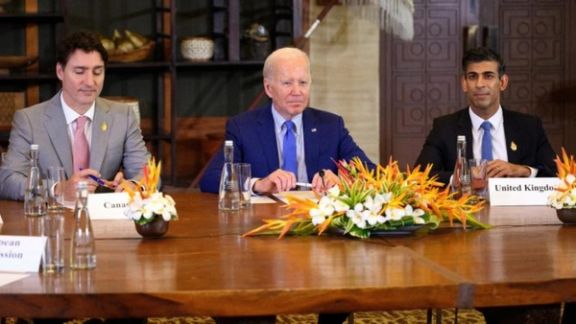
The signatories include a former President of the UN Human Rights Council, three former UN Assistant Secretaries-General, 17 former UN human rights Special Rapporteurs, 15 Nobel laureates, and many other distinguished human rights figures. International judges who signed the appeal include a former President of the International Criminal Court (ICC), a former President of the Court of First Instance of the European Communities, and five former Judges of the EU General Court. Some 34 NGOs and university institutions were also among the signatories.
Expressing their concerns over the regime’s decades-long record of executions, they also mentioned the mass executions of political prisoners, mostly members the exiled opposition group MEK (People’s Mojahedin Organization of Iran), who “were extra-legally executed or forcibly disappeared during the 1988 massacre.”
Denouncing “decades of apparent silence and inaction by the international community” that have helped “fuel a culture of impunity in Iran,” the signatories said, “Since the 1980s, the authorities in Iran have extra-judicially executed tens of thousands of dissident protesters and political prisoners, some as young as thirteen.”
The scholars called on the world’s leading democratic nations to act urgently to prevent the Iranian authorities in their attempts to quell the ongoing protests through the use of the death penalty in contravention of international law now while brave young Iranians continue their defiant protests to end decades of tyranny.
Urging the international community to hold the leadership of the Islamic Republic to account for committing crimes against humanity and the killing of children and public hanging of protesters, they called for using all internationally available means to bring the regime’s authorities to justice.
They also asked for more targeted economic sanctions that would help cut off funds to the state’s machinery of repression, and in particular blacklist the IRGC and its affiliated entities that are leading the crackdown. They finally demanded that world countries downgrade diplomatic ties with the Islamic Republic, including by withdrawing your ambassadors and likewise expelling the representatives of what is in fact a murderous government.”
Earlier in the day, Human Rights Watch confirmed that the Islamic Republic security forces used excessive and unlawful lethal force against protesters in Kordestan’s provincial capital, Sanandaj, in October and November 2022
“The Iranian authorities have unleashed alarming violence against protesters in Sanandaj since September,” said Tara Sepehri Far, senior Iran researcher at Human Rights Watch, adding, “Both the protests and the government’s brutal response to them reflect the government’s longtime repression of the Kurdish people’s cultural and political freedoms.”
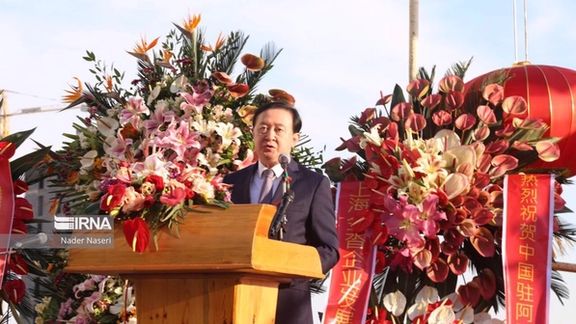
Despite a recent controversy about China siding with the United Arab Emirates against Iran, Beijing’s Consulate General officially opened in Bandar Abbas, a key port city.
In his address at the official opening ceremony of the consulate, Chinese Ambassador to Iran Chang Hua hailed the move as a fresh "landmark moment in China-Iran relations," adding that Beijing considers ties with the Islamic Republic “strategic.”
However, earlier this month during a visit to Saudi Arabia by Chinese President XI Jinping, China had signed off on a joint statement with the Gulf Cooperation Council, where a UAE claim on three Iranian islands were mentioned. This led to an avalanche of criticism against the Iranian regime, which has been boasting about its strategic ties with Beijing.
Noting that China supports and respects Iran’s national sovereignty and territorial integrity, Chang said “China decisively supports Iran against foreign intervention and for preserving its national sovereignty, territorial integrity, and national dignity.”
He highlighted that China sees ties with Iran from a strategic point of view, reaffirming Beijing’s determination to expand its partnership with Iran based on bilateral agreements as well as the 25-year comprehensive cooperation agreement between the two countries.
The opening of the consulate is described as an opportunity to actively implement the 25-year deal and China’s ambitious Belt and Road Initiative, a global infrastructure development strategy to invest in nearly 150 countries and international organizations. The BRI, originally named, “One Belt, One Road,” is an international development strategy as China looks to expand its influence worldwide by improving trade routes. As of December 2021, China had expanded its’ BRI—which includes infrastructure developments across land corridors, in ports, across maritime routes, as well as over-land links (bridges, tunnels, etc.)— into 142 countries. Developing diplomatic relations with Iran is crucial to China’s ability to implement the BRI.
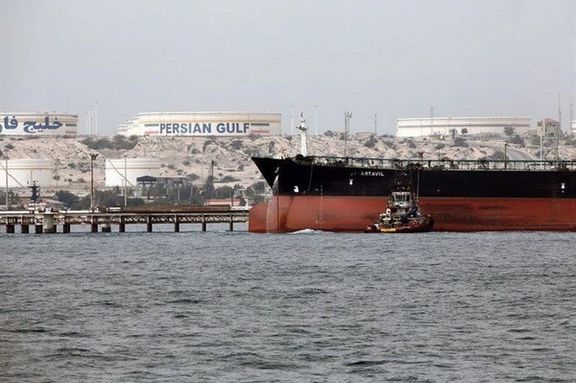
Adel Shahrzad, the deputy governor of Hormozgan province where the port is located, said during his speech that Iran's southern provinces look forward to increasing cooperation with China, adding that the opening of the consulate general will play an important role in developing bilateral relations and enhancing exchanges in various fields.
The area of responsibility of China's Consulate General in Bandar Abbas includes eight Iranian provinces in the south, namely Khuzestan province, Chaharmahal and Bakhtiari, Kohgiluyeh and Boyer-Ahmad, Fars, Bushehr, Kerman, Hormozgan, and Sistan-Baluchestan province.
Reports of the imminent inauguration of the consulate were circulating in media since at least a year ago but its final move can be seen as a sign of détente following the controversial joint statement by China and the GCC about three Iranian islands in the Persian Gulf.
Iran’s Council of Ministers approved the opening of a Chinese consulate in Bandar-Abbas, Iran’s most significant trading and military port on December 29th, 2021—China’s first consulate in Iran. While at face value this may seem like a benign partnership between two developing countries, it might have far-reaching significance for Iran and the region.
The new Chinese consulate in Bandar-Abbas will share its home with The Islamic Revolutionary Guard Corps’ main naval base. Iran’s invitation of an emerging global superpower into their backyard could pose a threat to Iran, should regional disputes one day arise. China has already “attempted to claim more internal waters, territorial sea, exclusive economic zone, and continental shelf than it is entitled under international law,” the spokesman of the US Navy’s Seventh Fleet said in 2019.
Although bilateral trade has declined in the past two years, China is still Iran’s top trading partner, buying illicit Iranian crude oil in the face of US sanctions. However, out of the two, China alone has enjoyed a favorable trade partnership, while Iran has been isolated internationally by essentially only being able to trade with China, forcing Iran to trade its oil reserves at much lower prices than it would otherwise like, although no official figures are available.
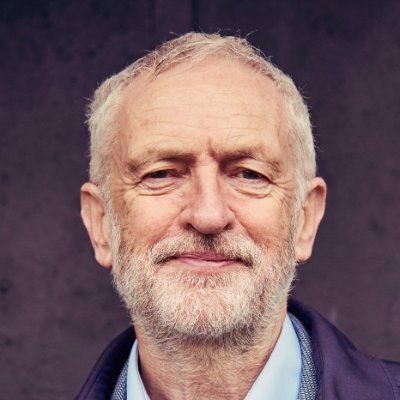
Prominent British Labor member of parliament Jeremy Corbyn has condemned the execution of protestors in Iran saying that it is “deplorable”.
In a tweet on Tuesday, Corbyn said he has written a letter to Iran’s Chief Justice Gholamhossein Mohseni Ejei urging him to reverse the convictions.
“I have been informed that at least 26 people are at risk of being executed…Many of the individuals involved have been denied fair trials, including the right: to access a legal counsel of their choosing; to be presumed innocent until proven guilty; to remain silent; and to receive a fair, public hearing,” reads the letter Corbyn published on twitter.
He also noted that there are reports that several defendants were tortured to induce “confessions”, which were later used as evidence in court.
Corbyn urged the regime to immediately reverse all convictions and death sentences of protesters and release those who have been detained for exercising their rights to freedom of expression, association, and peaceful assembly.
Holding fair trials, having access to legal counsel, and throwing out evidence acquired through use of forced confession were among the other things Corbyn urged the Islamic regime to do.
Iran has been the scene of nationwide anti-regime protests since mi-September. Over 500 people have been killed by security forces and more than 18,000 are imprisoned.